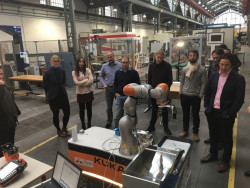COLROBOT: collaborative robotics solutions enabling robot to interact with workers for safer and better work places.
Our vision is to deliver a new generation of robotics technologies intended to physically interact with humans in a shared workspace, based on their ability to sense their environment. To this end, ColRobot aims to integrate a number of sensing systems and machine learning based software into two fully functional collaborative robotic systems, namely a robotic arm and mobile manipulator. ColRobot is developing a robotic system that is: • Flexible to handle, load, unload and pass different kinds of tools and parts of different dimensions and weight; • Safe, to enable the robot to work alongside humans on the factory floor; • Mobile, to allow the robot to move according to the production stages and manufacturing needs in real-time; and • Interactive, for seamless interfacing of the collaborative robot (cobot) with other machines and cooperation with humans through the recognition of intuitive and natural gestures, touch, and/or vocal commands. Two years on, ColRobot has already delivered a complete definition of the requirements for the automotive and aerospace industrial use cases where the robots will be operating. The manufacturing processes and the hazards related to the robotic interaction have been analysed in detail to inform the design of the robotic prototypes, so to avoid any risk to the people working with or next to the robot. For both demonstration scenarios, simulations with the designed prototypes have been performed to evaluate the feasibility of applying both the robotic arm and the robotic mobile platform on factory shop-floors. A first prototype of the flexible picking system, which enables a simple and efficient grasping of small parts, has been developed. The innovative gripper will be tested and mounted on a robotic arm in the near future. Further project developments include software for various types of human-robot interaction, the safety sensor system, as well as an overall software control architecture to support the integration of different technologies used in ColRobot. Pose tracking systems have been developed to support robot navigation and localization, and the overall robot control and the associated path-planning algorithms have been tested in automotive and aerospace environments. ColRobot has a high potential for positively impacting industrial manufacturing and society as a whole, through e.g. productivity increases, higher system flexibility, economic growth, and reduction of exposure of workers to non-ergonomic working conditions. To increase the impact of the project, we are committed to educate and train the companies and the engineers and technicians of the future through summer schools, workshops and lectures, to enable them to make full use of the competitive advantage offered by collaborative robotics. Our next workshop on “Robotics and Smart Manufacturing” will be held at the IEEE 16th International Conference on Industrial Informatics on 20 July 2018 in Porto (Portugal). According to Prof Olivier Gibaru (Ecole Nationale Supérieure Arts et Métiers Lille) coordinator of the project: “ColRobot will improve the working conditions in factories, making them more competitive and creating more, better, and safer jobs. We have reached the demonstration stage of the project and look forward to further advancing the integration of our technology so that tomorrow’s factories can benefit from the precision, flexibility and safety that cobots provide”. ColRobot is a 3-year project funded by the Horizon 2020 Programme of the European Union (GA 688807). The project is supported by a consortium of eleven organisations including Renault and Thales Alenia Space; leaders in the automotive and aerospace industry.
Keywords
colloraborative robotics, assembly and kitting, smart manufacturing., cobots, automotive, aerospace, grasping, industry 4.0, safer working places, Human-robot collaboration
Countries
Germany, Spain, France, Italy, Portugal



